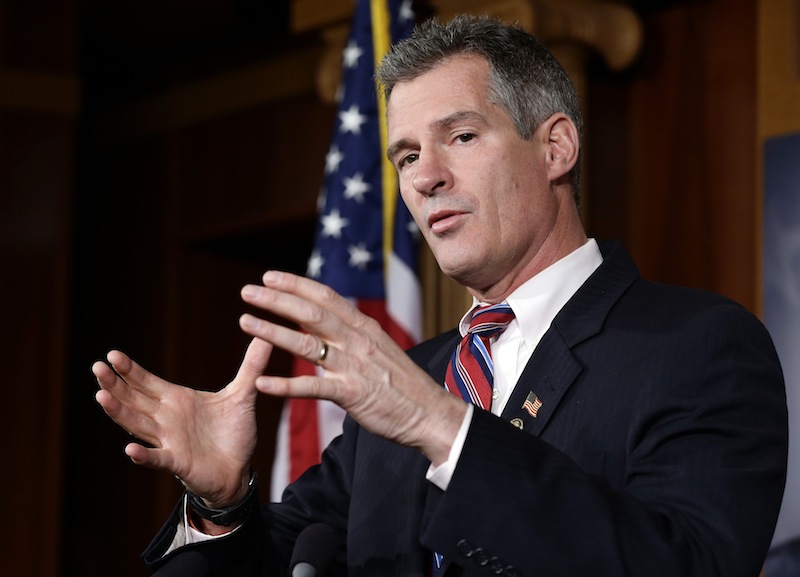BOSTON — Former Sen. Scott Brown said Friday he would not run in a special Senate election in Massachusetts, dealing a setback to Republican hopes of winning the seat being vacated by Secretary of State John Kerry.
Brown, who electrified his party with an upset win in a 2010 special election but lost his re-election bid in November, ended weeks of intense speculation about his future with a written statement announcing his decision.
“I was not at all certain that a third Senate campaign in less than four years, and the prospect of returning to a Congress even more partisan than the one I left, was really the best way for me to continue in public service at this time,” he said. “And I know it’s not the only way for me to advance the ideals and causes that matter most to me.”
GOP officials in Washington and Massachusetts widely considered Brown the strongest possible Republican candidate in a state that traditionally favors Democrats.
With Brown out of the running, potential Republican candidates include former Gov. William Weld, former Lt. Gov. Kerry Healey, state Rep. Daniel Winslow and former state Sen. Richard Tisei.
Brown won the special election for longtime Sen. Edward Kennedy’s seat following his death, but lost a bruising re-election battle last year to Democratic Sen. Elizabeth Warren. The Republican remained popular among Massachusetts voters, still had a statewide political organization and demonstrated an ability to raise tens of millions in campaign donations.
Democrats already have two congressmen in the race to replace Kerry, who resigned his seat and was sworn in Friday as secretary of state: U.S. Reps. Edward Markey and Stephen Lynch will face off in an April 30 primary.
Brown said his instinct was to run: “Over these past few weeks I have given serious thought about the possibility of running again, as events have created another vacancy requiring another special election,” he said. “I have received a lot of encouragement from friends and supporters to become a candidate, and my competitive instincts were leading in the same direction.”
Party leaders remained optimistic that they could still win the special election.
Kirsten Hughes, the newly-elected chair of the Massachusetts GOP said in a statement there were “many potential candidates” who were weighing their options now that Brown was out of the picture. She did not mention any names.
Hughes also alluded to Brown’s upset win in 2010.
“We shocked the world in 2010, and united, we can do it again,” she said.
Rob Collins, executive director of the National Republican Senatorial Committee, said it was time for the party to move forward after Brown’s announcement. He predicted a nasty Democratic primary between Lynch and Markey and said the GOP was intent on defeating “whichever career politician limps through.”
Massachusetts Democratic leaders expressed confidence they would keep Kerry’s former seat.
Markey and Lynch both issued statements Friday saying they understood and respected Brown’s reasons for not getting into the race.
Weld recently returned to Massachusetts to join a Boston law firm and had said he would consider a run for the Senate if Brown did not. Weld did not return a call seeking comment on Friday.
A message was also left with Healey, who served as lieutenant governor from 2003-2007 under then-Gov. Mitt Romney and lost the governor’s race to Democratic Gov. Deval Patrick in 2006.
Winslow, a former judge and chief legal counsel in Romney’s administration, said in a statement that he would reflect over the weekend on whether to run, weighing family considerations and “whether there is room in the national Republican Party for a member who is both fiscally prudent and socially tolerant.”
Tisei ran unsuccessfully for the U.S. House last year against Democratic Rep. John Tierney. He said Friday he was surprised by Brown’s decision and would discuss his options with family, friends and supporters in the coming days.
Candidates will have a tight window — about four weeks — to gather the required 10,000 signatures to get their names on the primary election ballot.
The general election is scheduled for June 25.
The winner of the special election would have to face voters again in November 2014, when Kerry’s six-year term would have expired.
Patrick this week named William “Mo” Cowan, a former top aide, to fill Kerry’s seat on an interim basis until the election.
Send questions/comments to the editors.



Comments are no longer available on this story